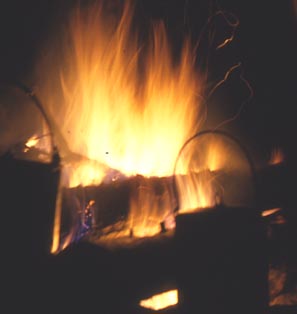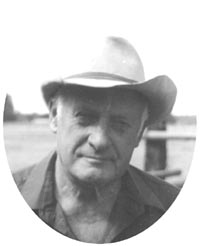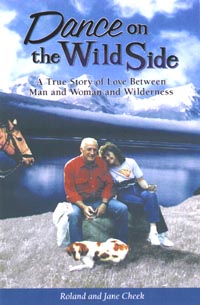a weblog sharing info on outdoor skills and campfire musing by a guy who spends a bunch of time in pursuit of both
CULTURE
WHERE -
TALES ARE TOLD OF
Welcome to Roland Cheek's Weblog
Roland is a gifted writer with a knack for clarifying reality. Looking forward to more of his wisdom
- Carl Hanner e-mail
Aldo Leopold wrote in A Sand County Almanac: "When I first saw the West, there were grizzlies in every major mountain mass." Then he added, ". . . Of the 6000 grizzlies officially reported as remaining in areas owned by the United States, 5000 are in Alaska. Only five states have any at all. There seems to be a tacit assumption that if grizzlies survive in Canada and Alaska, that is good enough. It is not good enough for me. The Alaskan bears are a distinct species. Relegating grizzlies to Alaska is about like relegating happiness to heaven; one may never get there."
To access Roland's weblog and column archives
Tip o' the Day
"Never shoot from 10 a.m. to 3 p.m."
"Seek wildlife subjects that are conditioned to human presence."
"Make sure there's a glint in the eyeball of your subject."
"Photograph people with wildlfie when possible."
All the above advice came from a few of the best wildlife photographers in America. It was during a panel on "Wildlife Photography" at a convention of Outdoor Writers Association of America, back in the 1980s (before digital cameras). I shrugged, smiled in chagrin, and sighed.
There was a time when I would've scribbled furiously at each pearl of wisdom falling from those photographers' lips (I once dreamed of becoming a successful wildlife photographer). That dream -- like a few others -- was discarded when facing reality: that my dogged pursuit of another way of life clashed with making a success of wildlife photography.
At the time of that OWAA annual convention I'd worked as an outfitter and guide in the Bob Marshall Wilderness for nearly two decades, and had been writing newspaper columns about those adventures for six years. Too, I'd photographed and written a coffee table book about that wilderness. But my occupation did not permit exercising the kind of patience necessary for becoming a photographer of wild creatures. To capture wildlife on film, a photographer's first commitment is to his photograph. In my primary occupation, my first commitment had to be the guests I was leading to adventure.
I sighed again. All those top photographers said they seldom use a normal camera lens (55mm). Instead, they use telephoto lenses to 400mm. But the higher-powered lenses are used only with a tripod or stock-mounted support device. Each sometimes shot from blinds -- usually ones they build themselves, going to considerable effort to construct a blend-with-the-surroundings way to stay hidden near a waterhole, meadow, or major game crossing.
Obviously the 10-to-3 edict is to avoid the flat light of midday.
Seeking wildlife subjects conditioned to human presence means shooting for the most part in National Parks or Wildlife Refuges.
The glint-in-the-eye injects life in the animal, but it doesn't mean not shooting a pack of wolves battling a grizzly bear just because you can't get them to stop long enough to capture the glint.
Three years later Jane and I sold our guide service and most of our horses and tack. I remembered the old dream, purchased two top-of-the-line Nikon camera bodies and a powerful variable lens to 200mm, then set out to add support photos to magazine pieces cranked out regularly to America's top outdoor magazines. It wasn't long, however, that I noticed something: the magazines were buying my stories, but they always used someone else's photographs.
My conclusion? Photographers should photograph, writers should write. And never the twain should meet.
UNCONDITIONAL LOVE
Love has never been nailed down with a clarity I can fully grasp. It's like asking the meaning of life? Where is happiness? Who is God? Why are we here? We know what it is when we love and are loved, but try and describe it! When nobody else can anchor those questions with answers that sounds right to a guy who's listened to the swoop of a nighthawk's wings and the clip-clop of horse hoofs, then I rightly figure some thiings are mostly unknowable.
Like love--even to lovers.
So if Shakespeare, Robespierre, and Chaucer couldn't successfully package, wrap and deliver love so's folks in the back of the bus didn't snicker behind their hands, who can?
Us, maybe.
That's why I'm in favor of Valentines Day--it allows we plebians opportunity to define our interpretation of love without having the conversation dominated by talk show hosts, psycho shrinks, or the religious right. Maybe a cute curly-haired kid wearing a diaper and angel wings, fluttering around overhead and shooting arrows into hearts isn't quite what we had in mind, either. But maybe it's closer to the bone than psychiatry's willingness to define a broken heart by the fact their patient wasn't properly toilet trained in pre-puberty.
On the other hand, perhaps love isn't all that difficult to define. I once read this quote attributed to Reverend Warren Keating of Yuma, Arizona, who said the best prayer he ever heard was, "Lord, please make me the kind of person my dog thinks I am."
How true--it's hard to find love more unreserved than the affection lavished by a dog on it's mistress or master. It's the kind of love that demands return. A child's love is also like that--unconditional.
Though I can't define love any easier than the next guy, I believe there are transitions along the way to lasting love. For instance: yes, a child's love is unconditional, but don't we then pass through a period when we begin to put conditions on our feelings (say as teenagers or young adults)? And don't we--if we're really lucky, or smart, or both--come to understand the person with whom we choose to live is not perfect in every way, but also learn to work around or overlook their partner's faults in order to once again love unconditionally?
That's what I'd call love with a mature face--unconditional across fault lines. Unconditional love is in its most functional mode when it's mutual. It's the kind of open-eyed fondness for one another often found among elderly couples. Mature, unconditional love is built on respect and compatibility and forgiveness and kindness and . . . (insert your own foundation chain). Mature love is the kind of we'd-rather-be-together-love that leads her into camping and him into watching local theater performances. It's the courtesies shown one another in private as well as in public; the concerns for the other's health and well-being; the aging gracefully together; the care each lavishes upon the other.
Our love is mature, my sweetheart's and mine. It's also unconditional--though at least one of us (I'll name no names, cast no stones) has a minor fault or two.
And yes, Janie, this is your Valentine. I hope it'll do.
* Thought for the day: If Hatred can best be described as emotionally charged ignorance, how about love? can it best be described as emotionally charged wisdom?
Christopher Morley wrote: If we discovered that we had only five minutes left to say all we wanted to say, every telephone booth would be occupied by people calling other people to stammer that they loved them.
Roland Cheek wrote a syndicated outdoors column (WildTrails and Tall Tales) for 21 years. The column was carried in 17 daily and weekly newspapers in two states. In addition, he scripted and broadcast a daily radio show (Trails to Outdoor Adventure) that aired on 75 stations from the Atlantic seaboard to the Pacific Ocean. He's also written upwards of 200 magazine articles and 12 fiction and nonfiction books. For more on Roland, visit:
www.rolandcheek.com
Recent Weblogs
Tuesday, February 10, 2009
for more info about these and other Roland Cheek books
There's a bunch of specific info about Roland's books, columns, and archives. By clicking on the button to the left, one can see Roland's synopsis of each book, read reviews, and even access the first chapter of each of his titles. With Roland's books, there's no reason to buy a "pig in a poke."
for detailed info about each of Roland's books
Read Reviews
Read their first chapters
For interested educators, this weblog is especially applicable for use in history, economic, and government classes, as well as for journalism students.
Roland, of course, visits schools. For more information on his program alternatives, go to:
NEXT WEEK:
AGE & KNOWLEDGE OPPOSING YOUTH & INNOCENCE
www.campfireculture.com
Learning To Talk Bear is Roland's best-selling book, now in its 5th printing. About the book, he writes: "Grizzlies . . . are the Marine Band of the animal world. They swagger with the calm indifference of an animal who knows he has nothing left to prove. . . .
"Not all grizzly bears are Jeffrey Dahmers or Jack the Rippers in fur coats. Perhaps that the "why" for this book."
Roland writes: "Elk took me the wildlife dance over 50 years ago. I became an elk hunter. Then I became infatuated with all God's creatures, and eventually a believer that God's handiwork is composed of such intracacies that a quest to understand has taken the rest of my life. The Phantom Ghost of Harriet Lou is about that quest."
Roland says about Dance On the Wild Side: "This book is about two people in love, sharing a life of dreams amid exciting adventure -- and growing in the process. In reality, it's about any couple who live and love and share and sruggle to achieve the life they wish.
An entire book about a single grizzly bear, a bear that made the pages of The New York Times. Chocolate Legs is a first class murder mystery that may leave you wondering if justice was done
America's first book about what one U.S. Forest Service Chief called, "The Crown Jewel of the Wilderness System." 9 X 12 coffee table size / 97 full-color photos.
One hundred of the best of Roland's 2,700 past newspaper columns and radio scripts
First book in Roland's popular Valediction For Revenge western series
source links for additional info
to send this weblog to a friend
to tell Roland what you think of his Campfire Culture weblog
to visit Roland's newspaper columns and weblog archives








